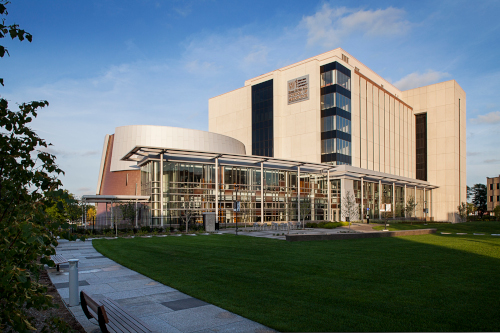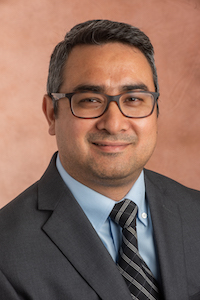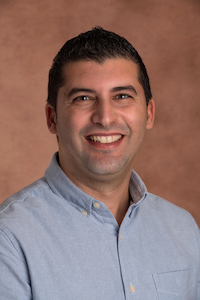
How have markers for anxiety and depression changed in Kalamazoo County children and adolescents since the beginning of the COVID-19 pandemic?
That’s the question Mahesh Shrestha, MD, an assistant professor in the medical school’s Department of Pediatric and Adolescent Medicine, seeks to answer in his latest research project, bolstered by his involvement in the first cohort of the medical school’s Research Academy.
“There hasn’t been a lot of studies about how school closures affected anxiety and depression levels,” Dr. Shrestha said. “We’re looking at how that and how the availability of vaccinations affected things.”
Dr. Shrestha is one of four faculty members at the medical school who are nearing the completion of one year in the first cohort of the Research Academy, a two-year structured training program intended to encourage faculty members to conduct research related to their interests and areas of medicine. Dr. Robert Sawyer, chair of the medical school’s Department of Surgery, serves as director of the new Research Academy, and he and Lisa Graves, MD, the medical school’s Associate Dean for Faculty Affairs, mentor the scholars.

“Being in the Research Academy has made me much more confident,” Dr. Shrestha said. “It was very easy to contact people involved in research at WMed and get them on board with my project. If I had not had the Research Academy, I would have had to go the longer route. Dr. Graves and Dr. Sawyer are excellent in helping us and I feel much more confident in doing this research with them.”
Ten months in, the first cohort has applied for grants, started several research projects and collaborated on research, as expected, Dr. Graves said. Several faculty members across the medical school have spoken to the group and shared their knowledge and research lessons. By sharing their passion for their work with each other, the scholars have spurred each other’s ideas on, Dr. Graves said.
“You wouldn’t think that a forensic anthropologist, a researcher in the department of orthopedics, a family doctor and a pediatrician would be able to think about what kind of research questions we can answer together and that’s what is happening,” Dr. Graves said. “It speaks to the members of our cohort that they’re able to think so broadly about their work. It speaks to one of the unique things WMed brings to scholarly work is that we are small enough that you can do this sort of thing.”
The idea for the Research Academy grew from the desire to increase the amount of research and academic activity happening at the medical school, and a way to help faculty members who do not have a significant background in publications and grants.
In a large medical school, a faculty member can spend an entire career working with people within his or her specialty, but at WMed, it’s easier to work between departments, Dr. Graves said.
“The Research Academy is a perfect example of how when we let those conversations happen all of a sudden the ideas start flowing.”
Two goals of the Research Academy are to train current and future faculty to be more productive and efficient in research, and to increase the quality and quantity of research in all aspects of medicine at WMed. Faculty members who are selected to participate in the two-year course are assistant professors or associate professors who have responsibilities to teach and participate in clinical work.
Several outcomes are measured at the end of the academy course and the following three years, including the number of abstracts scholars submitted and presented to regional, national and international meetings, the number of manuscripts submitted to peer-reviewed journals and their number of peer-reviewed publications. So far, the members of the first cohort are exceeding expectations, having already spoken and presented some research and, in some cases, tackling a second research project, Dr. Graves said.
Joining Dr. Shrestha in the first cohort that started in February 2021 are Adil Akkouch, PhD, an assistant professor in the Department of Orthopaedic Surgery and in the Program in Medical Engineering; Christine Pink, PhD, an assistant professor in the Department of Pathology; and Ramona Wallace, DO, an assistant professor in the Department of Family and Community Medicine.

Dr. Akkouch has used his time in the Research Academy to develop a research project that explores using biodegradable, antibacterial mesh for hernia repair. The “smart mesh” senses bacterial growth and releases antibacterial agents to combat it. Dr. Akkouch has partnered with Dr. Sawyer on a grant that was funded through WMed’s Pilot Research Project Support Program.
Dr. Akkouch said he has discussed with Dr. Pink and Dr Wallace their respective projects in areas of interest that overlap with his. He collaborated with Dr. Pink on a grant that has been submitted for external funding, and is working with Dr. Wallace to gain approval from the medical school’s Institutional Review Board for their study on the role of vitamin deficiency in the skeletal system. In addition, he has asked his fellow scholars to serve as organizing committee members for Research Day 2022 at WMed.
“We have people here with different backgrounds and expertise in different areas,” Dr. Akkouch said. “Having scholars that want to do research and assemble them, it gives them teammates and they can find a common realm to work together.”
WMed’s Research Academy will grow and evolve, which is important because medical schools are often defined by their scholarship, Dr. Graves said. Scholars in the Research Academy are showing other faculty members, residents and medical students what balancing full-time teaching, clinical work and research looks like, she said.
“We are developing a culture of inquiry, of asking good questions,” Dr. Graves said. “The scholars in the Research Academy are asking good questions about how to educate residents and how to care for people in our community.”
A second cohort of scholars started this fall, consisting of Maureen Ford, MD, an assistant professor in the Department of Emergency Medicine, Nic Helmstetter, MD, an assistant professor in the departments of Pediatric and Adolescent Medicine and Medicine, Valrie Honablue, MD, an assistant professor in the Department of Psychiatry, Lisa Leininger, PsyD, an assistant professor in the Department of Psychiatry and Priscilla Woodhams, MD, an assistant professor in the Department of Pediatric and Adolescent Medicine.
Applications will be accepted until June 30, 2022, for a third cohort that will begin in September 2022.
